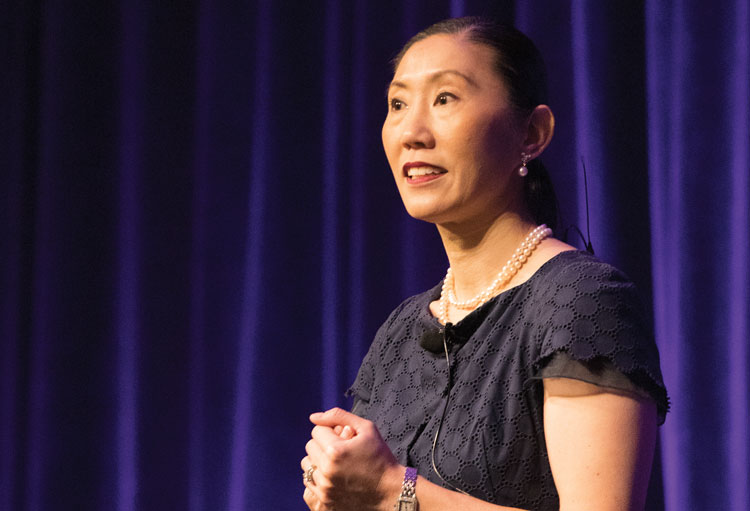ABA Techshow 2020 adopted a holistic approach to law

Photo by Saverio Truglia/ABA Journal
“I’m not a lawyer,” Mary Shen O’Carroll said during her keynote speech at ABA Techshow 2020, which took place Feb. 26-29 at the Hyatt Regency hotel in downtown Chicago.
The director of the legal operations, technology and strategy team at Google has always been interested in working faster and making things more efficient—two qualities that never have been associated with lawyers.
However, she argued the legal industry finally seems to be moving closer to where she’s always been.
“This is an industry that’s been stuck in time for a long time,” she said. “There are changes happening all around us, and [they’re] accelerating.” She added that bringing about necessary changes in the legal industry would require collaboration and cooperation.
In that vein, this year’s incarnation of Techshow promoted a holistic approach to legal technology. A diverse group of speakers and panels provided conferencegoers with information, tips and strategies across a wide range of topics, including the accuracy of artificial intelligence in legal research, marketing, online dispute resolution, wellness, ethics, recruiting and retention of employees.
Rather than promoting tech for tech’s sake, conference speakers and panelists recommended attendees evaluate their needs and think about potential consequences before adopting new programs, platforms or apps.
“In terms of how I decide to use technology, I ask myself if it will make me a better instructor. I never try to use technology just because I want to use technology; there’s got to be a pedagogical reason,” April Gordon Dawson, a constitutional law professor at North Carolina Central University School of Law, said during a Feb. 27 panel titled “Skills Building: Best Practices for Teaching Tech to Law Students.”
Dawson said she uses QR codes to take attendance. Additionally, her students submit summaries of what they have learned—and have an opportunity to ask questions about—on the online platform Airtable.
Meanwhile, lawyers looking to utilize cloud computing and storage should stay up to date on technological advances and thoroughly vet cloud storage providers before using them, while recognizing that in some cases it might not be for them. During a Feb. 28 panel titled “Cloudy, with a Chance of Sanctions—or Success!” Nicole Black, who is the legal technology evangelist at MyCase and an ABA Journal columnist, cautioned that if a firm has a client who is a celebrity, a dissident or even a terrorist, it should think twice about using the cloud.
“There’s certain things that are that sensitive that you probably want to protect and not put in the cloud and have this extra layer of protection within your office, because that information is so valuable to people that have a reason to try to access it, whether it’s for money or political gain,” Black said. She added firms should ensure they thoroughly vet cloud-computing providers before signing up, measuring security and the provider’s backup strategy.
For lawyers interested in setting up a subscription plan, Atlanta solo practitioner Kimberly Bennett said using technology to keep overhead as low as possible while allowing lawyers to work more efficiently is a must. That means, at a minimum, document-automation software, practice management tools and e-payment programs.
Bennett cautioned, however, that lawyers must first go over their books and figure out what kind of firms they are before implementing wholesale changes. “You must understand what’s happening in your business now before you decide to go to a model like a subscription later,” she said during panel titled “You’re So Predictable: Subscription Legal Services” on Feb. 27. “After all, you’re not going to design a subscription that’s not profitable.”
Of course, sometimes you have to know when to disconnect. During a Feb. 28 panel titled “The Intersection of Ethics and Well-Being,” criminal defense attorney Jennifer Gerstenzang of San Diego said there are several factors contributing to issues with attorneys’ mental well-being, including the feeling of always being on call and unable to disconnect. She said while technology helps attorneys with efficiency, it also makes it difficult for them to take the time they need to recharge.
Fellow panelist Sharon Nelson, co-founder of Sensei Enterprises in Fairfax, Virginia, agreed that it’s important for legal professionals to recognize that technology and constant connectivity play a large role in well-being issues.
“In a technology conference, sometimes you have to teach people how not to use technology and how to carve some time for their own well-being,” she said.
This article appeared in the June/July 2020 issue of the ABA Journal under the headline: “Not Just About Tech: ABA Techshow 2020 adopted a holistic approach to law, highlighting wellness, marketing, ethics and more.”



